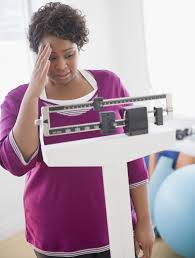I was watching a Tyra Banks show a while ago and the topic was women and their bodies. The black men touted that they preferred women with a little meat on their bones. In some of the circles that I am in, I've over heard many of my Caucasian friends say that their men prefer them skinny and the fear of fat often drives them to calorie counting and bootcamps and spin classes every week.
 But for black women exercise and healthy eating are not prominent. 64% of African-American women are sedentary (inactive) and get no leisure time physical activity. African-American women also have higher rates of obesity, high blood pressure, and diabetes.
But for black women exercise and healthy eating are not prominent. 64% of African-American women are sedentary (inactive) and get no leisure time physical activity. African-American women also have higher rates of obesity, high blood pressure, and diabetes.
This phrase 'meat on their bones' is used so frequently in our community. As a woman who once had a little bit more 'meat on her bones' I feel comfortable talking about this. Are we black women taking this phrase for face value? Have we become complacent in taking care of our bodies because we think our men prefer us that way?
Healthy means you have a good heart rate, sugar level and cholesterol level. It means your body's in good condition.
Now, it should be pointed out that black women are naturally curvier than other ethnic groups and by all means we should embrace that. The issue is not the curves; the issue is not taking care of ourselves because we think that's what men want.
Having a little meat on your bones does not mean overweight or obese. It means that there's more to feel than bones. It means healthy and that's something that must be said because skinny is not necessarily healthy. Healthy means that you have good numbers; a good heart rate, sugar level and cholesterol level. It means that your body is in good condition.
 When black men say they want thick women, in most cases they aren’t necessarily saying they want a 200+ pound woman. Thick to most black men is Beyonce and nothing about her is obese or overweight. In fact, she is quite fit and restricts the foods that she eats. Black men are saying that they love our God-given curves and that we should love them too when they say they want us thick and with a little meat. What they are not saying is that they want a woman who has just let herself go.
When black men say they want thick women, in most cases they aren’t necessarily saying they want a 200+ pound woman. Thick to most black men is Beyonce and nothing about her is obese or overweight. In fact, she is quite fit and restricts the foods that she eats. Black men are saying that they love our God-given curves and that we should love them too when they say they want us thick and with a little meat. What they are not saying is that they want a woman who has just let herself go.
Boris Kodjoe went to twitter earlier this year with his #FatExcuses of what's keeping black women inactive and opting for the unhealthiest choices. Though many were offended by his comments, it did prove that not all black men like or prefer 'thick women' or 'women with a little meat on their bones' in the context of an overweight woman.
MORE RESOURCES FROM FAITH & FITNESS MAGAZINE
– Fit Family = Husband & Wife Teamwork
– Are You Fit Enough For Intimacy
– Helping Make Military Families Stronger
– How To Regulate Your Blood Sugar Through Proper Nutrition
– More articles by Enliven Editor Arian Moore
The point is, no one is making us or keeping us fat. Taking care of your body and the desire to do so is something that comes from within. It's a loveship that you have to have with yourself. Whether a man wants you or not, is not the point. Do you want yourself?
 God's love for us should inspire us to love ourselves and loving ourselves means that we value our bodies enough to be active and eat foods that cause them to function at their best.
God's love for us should inspire us to love ourselves and loving ourselves means that we value our bodies enough to be active and eat foods that cause them to function at their best.
MORE INSPIRATION: Read the story of Miya Miles. Her desire within was to have a greater love for herself and a deeper relationship with God. She ultimately combined a more risky surgery with being active and eating better to gain a healthier life at her naturally curvier beauty.
QUESTIONS FOR PERSONAL REFLECTION AND GROUP DISCUSSION
1. Rate yourself (satisfied, 50/50, dissatisfied) in the following areas: Your diet (what you eat and how much you eat), your physical fitness (energy level, ability to move, wellness), your personal appearance, and your relationship with your husband/fiancé/boyfriend. What makes you rate yourself this way? What simple things can you begin to do to become more satisfied in all these areas?
2. Arian asks, "Have we become complacent in taking care of our bodies because we think our men prefer us that way?" Take time to discuss this topic with your man. Share with him how you feel and what goals you'd like to work toward. Ask him to share his attitudes and perceptions. How do you feel this conversation will go? What can you do to guide this conversation properly? Be sure to take time to pray together.
3. The story of Miya Miles helps illustrate the concept of "loveship for yourself" that Arian encourages you to have. How has God been talking with you lately about taking better care of yourself? What does it mean to you to "Want yourself"? What are some practical and simple ways you can begin to care better care of your body? If you had more time for yourself, what would you do? How can you create more intentional time for you?

Sources:
Lloyd-Jones D, Adams R, Brown T,. et al. Heart Disease and Stroke Statistics 2010 Update: A Report From the American Heart Association Statistics Committee and Stroke Statistics Subcommittee. Circulation. 2010;121:31-e170.
Pleis JR, Lucas JW. Summary health statistics for U.S. adults: National Health Interview Survey, 2007. Vital Health Stat 10. 2009; No. 240: 1-159.






